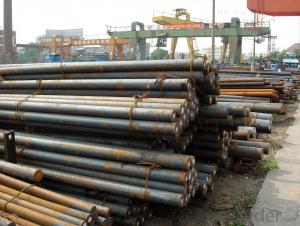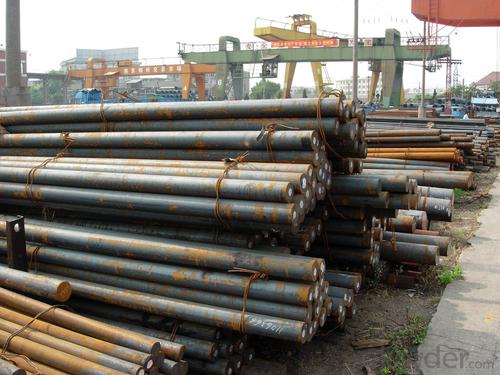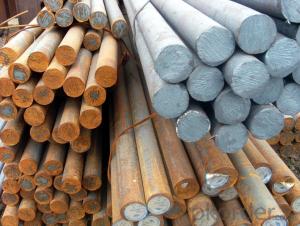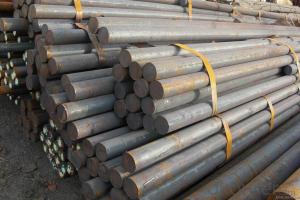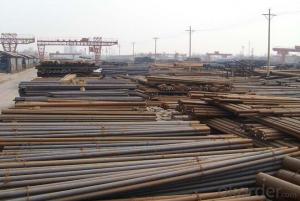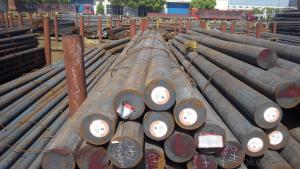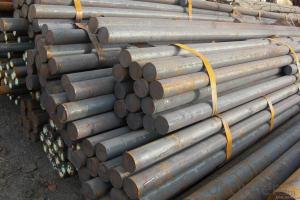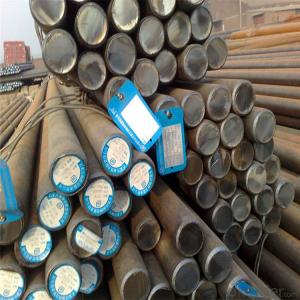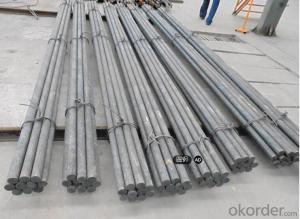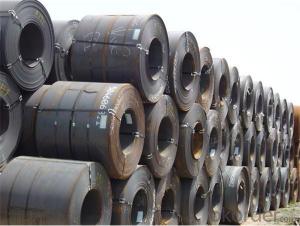Alloy Steel C45/S45C/45/1045 Carbon Round Steel
- Loading Port:
- China main port
- Payment Terms:
- TT or LC
- Min Order Qty:
- 25 m.t.
- Supply Capability:
- 10000 m.t./month
OKorder Service Pledge
OKorder Financial Service
You Might Also Like
Specification
The details of our Steel
1. Produce Standard: as the GB, AISI, ASTM, SAE, EN, BS, DIN, JIS Industry Standard
2. Produce processes: Smelt Iron -EAF smelt Billet - ESR smelt Billet -Hot rolled or forged get the steel round bar and plate
3. Heat treatment:
Normalized / Annealed / Quenched+Tempered
4. Quality assurance:
All order we can received Third party inspection, You can let SGS, BV,.. and others test company test and inspect our products before Goods shipping.
Product information
Chemical Composition(GB)%
standard | C | Si | Mn | P | S | Ni | Cr | Cu |
45 | 0.42-0.50 | 0.17-0.37 | 0.50-0.80 | ≤0.035 | ≤0.035 | ≤0.30 | ≤0.15 | ≤0.25 |
S45C | 0.42-0.48 | 0.15-0.35 | 0.60-0.90 | ≤0.030 | ≤0.035 | ≤0.20 | ≤0.20 | ≤0.230 |
Heat Treatment
Item | Temperature ℃ | Hardness |
normalizing | 850-870 | 170-217HBS |
Characterstics
1.Commonly used in carbon quenched and tempered steels |
2.Higher strength and better cutting processability |
Applications
1.Suitable for cold stamping die wedge, screw, plate, etc |
2.Other parts of cold work mould |
3.Used for hot forging, die casting, hot stamping and hot mould parts |
Product show

Workshop show

- Q: What are the main applications of special steel in the marine sector?
- Special steel is widely used in the marine sector for various applications. Some of the main applications include shipbuilding, offshore oil and gas exploration, and marine equipment manufacturing. Special steel is used to construct the hulls and superstructures of ships, as well as various components such as propellers, shafts, and rudders. Its high strength, durability, and corrosion resistance make it ideal for withstanding the harsh conditions of the marine environment. Additionally, special steel is also used in the construction of offshore platforms, pipelines, and underwater structures, as it can withstand extreme pressures and resist corrosion caused by saltwater.
- Q: What are the challenges in manufacturing special steel?
- Some of the challenges in manufacturing special steel include the high cost of raw materials, the complex and precise production processes, ensuring consistent quality and performance, meeting specific customer requirements, and staying up-to-date with rapidly advancing technologies and industry standards. Additionally, the demand for customization and shorter lead times can also present challenges in terms of production planning and logistics.
- Q: What are the specific requirements for special steel used in the agricultural sector?
- Special steel used in the agricultural sector has specific requirements to ensure optimal performance and durability in the demanding conditions it will be subjected to. Some of the key requirements for special steel in the agricultural sector include: 1. Corrosion resistance: Agricultural equipment often comes into contact with corrosive substances such as fertilizers, pesticides, and animal waste. Special steel used in this sector must have high resistance to corrosion to prevent premature deterioration and ensure long service life. 2. High strength: Agricultural equipment is subjected to heavy loads, impacts, and vibrations during operation. Special steel used in this sector must possess high tensile strength and toughness to withstand these forces without deformation or failure. 3. Wear resistance: Agricultural machinery operates in abrasive environments, where soil, rocks, and other debris can cause significant wear on metal surfaces. Special steel used in the agricultural sector should have excellent wear resistance to maintain sharp cutting edges and prevent premature wear. 4. Machinability: Agricultural equipment often requires complex components with intricate shapes and profiles. Special steel used in this sector should have good machinability to enable easy fabrication, welding, and shaping of the steel into the desired form. 5. Heat resistance: Some agricultural processes involve high temperatures, such as heat treatment or exposure to hot gases. Special steel used in these applications should have good heat resistance to maintain its mechanical properties and structural integrity even at elevated temperatures. 6. Cost-effectiveness: Agricultural equipment manufacturers often need to balance performance with cost. Special steel used in the agricultural sector should provide a cost-effective solution, offering the desired properties at a competitive price. By meeting these specific requirements, special steel used in the agricultural sector can provide reliable and efficient performance, contributing to the productivity and longevity of agricultural machinery and equipment.
- Q: Can special steel be used for tooling applications?
- Yes, special steel can be used for tooling applications. Special steel, such as high-speed steel or tool steel, is specifically designed to have superior hardness, wear resistance, and toughness, making it highly suitable for tooling applications where durability and precision are crucial.
- Q: What are the applications of special steel in the power generation manufacturing process?
- Special steel has various applications in the power generation manufacturing process. It is commonly used in the construction of turbines, boilers, and other critical components. The high strength and heat-resistant properties of special steel make it suitable for withstanding extreme conditions and ensuring efficiency and reliability in power generation. Additionally, special steel is used in the manufacturing of transmission lines, transformers, and electrical equipment, as it provides excellent conductivity and resistance to corrosion. Overall, special steel plays a crucial role in enhancing the performance and longevity of power generation systems.
- Q: How is corrosion-resistant stainless steel used in the production of marine equipment?
- Corrosion-resistant stainless steel is extensively used in the production of marine equipment due to its ability to withstand the harsh corrosive environment of saltwater. It is used for various applications such as shipbuilding, offshore structures, and marine components like propellers, valves, and fittings. The stainless steel's resistance to corrosion helps prevent rust and degradation, ensuring the longevity and durability of marine equipment even in challenging marine conditions.
- Q: What are the different defense grades of special steel?
- Enhanced properties are possessed by special steel, which is a distinct category of steel that is specifically designed. These properties include increased strength, durability, and resistance to various environmental factors. In the realm of defense applications, special steel is frequently utilized to produce armor and protective components for military vehicles, aircraft, and naval vessels. The defense grades of special steel are classified based on their specific characteristics and performance levels. One of the most commonly utilized defense grades of special steel is referred to as ballistic steel. Ballistic steel is engineered to offer exceptional resistance against ballistic threats, which encompass bullets and shrapnel. It possesses high tensile strength and hardness, which enables it to endure the impact and penetration of projectiles. Several grades of ballistic steel exist, such as MIL-A-46100, MIL-A-12560, and AR500, each providing varying levels of protection against different types of ammunition. Another defense grade of special steel is known as blast-resistant steel. This form of steel is designed to withstand explosions and minimize the damage caused by shockwaves, fragmentation, and heat. It is commonly employed in the construction of blast-resistant walls, doors, and windows for military bases, embassies, and critical infrastructure facilities. Blast-resistant steel grades are classified based on their capacity to withstand different levels of explosive forces, with higher grades offering greater protection. Furthermore, specialized grades of special steel are employed for anti-vehicle applications. These grades, such as Armox and Ramor, are engineered to resist the impact of heavy-caliber projectiles and explosive devices, making them suitable for the production of armored vehicles and personnel carriers. They possess a combination of high hardness, toughness, and energy absorption properties, ensuring the safety of military personnel on the battlefield. In conclusion, the defense grades of special steel are varied and tailored to meet the specific requirements of diverse defense applications. They provide essential protection and ensure the safety of military personnel and equipment in challenging and hostile environments. The appropriate grade is chosen based on the nature of the threat, the level of protection required, and the specific design and performance criteria of the defense application.
- Q: What are the requirements for special steel used in industrial equipment manufacturing?
- To ensure the suitability of special steel for use in demanding applications in industrial equipment manufacturing, certain requirements must be met. These requirements include: 1. Exceptional strength: Given the heavy loads that industrial equipment often encounters, special steel must possess superior strength properties to withstand these forces. It should exhibit high levels of yield strength, tensile strength, and hardness to prevent deformation or failure. 2. Resistance to corrosion: Industrial environments are frequently subject to corrosion caused by exposure to chemicals, moisture, or extreme temperature fluctuations. Therefore, special steel used in such applications should possess excellent corrosion resistance to prevent degradation and ensure long-term performance. 3. High resistance to wear: The friction, abrasion, and impact experienced by industrial equipment often lead to significant wear. Consequently, special steel needs to exhibit exceptional wear resistance to maintain its integrity and prevent premature failure. 4. Toughness and resistance to impact: Industrial settings can subject equipment to sudden shocks, impacts, or vibrations. To withstand such events, special steel should demonstrate good toughness and resistance to impact, absorbing energy and resisting fracture or cracking. 5. Ability to withstand high temperatures: Certain industrial processes expose equipment to high temperatures or rapid temperature changes. Special steel must exhibit excellent heat resistance, retaining its strength, hardness, and other mechanical properties even at elevated temperatures. 6. Ease of machining: Special steel used in industrial equipment manufacturing should be easy to machine, facilitating the fabrication process. It should allow for simple cutting, drilling, welding, and other machining operations without excessive tool wear or damage to the material. 7. Dimensional stability: Equipment components must maintain their shape and dimensions under various operating conditions. Special steel needs to exhibit dimensional stability to prevent warping, distortion, or dimensional changes that could impact the performance or assembly of the equipment. By meeting these requirements, special steel used in industrial equipment manufacturing can endure harsh conditions, deliver reliable performance, and have a long service life. Ultimately, this contributes to the overall efficiency and productivity of industrial processes.
- Q: How does heat-resistant steel perform in high-temperature applications?
- Heat-resistant steel is specifically designed to withstand high temperatures without losing its mechanical properties. It exhibits excellent strength, corrosion resistance, and thermal stability, making it ideal for high-temperature applications. This type of steel can maintain its structural integrity and resist deformation, oxidation, and creep even at extremely elevated temperatures, ensuring reliable and long-lasting performance in demanding environments.
- Q: What are the different applications of stainless special steel?
- Stainless special steel, also known as stainless steel, is a versatile material that finds applications in various industries due to its unique properties. Some of the different applications of stainless special steel include: 1. Construction: Stainless steel is widely used in the construction industry for its durability and corrosion resistance. It is used in structural components, bridges, building facades, and roofing materials. 2. Automotive industry: Stainless steel is extensively used in the automotive sector for its strength, heat resistance, and durability. It can be found in exhaust systems, mufflers, catalytic converters, fuel tanks, and various other components. 3. Medical equipment: Stainless steel is the material of choice in the medical field due to its high corrosion resistance and biocompatibility. It is used in the manufacture of surgical instruments, implants, orthopedic devices, and medical equipment. 4. Food processing industry: Stainless steel is widely used in the food industry due to its hygienic properties. It is used in the production of food processing equipment, storage tanks, food preparation surfaces, and utensils. 5. Aerospace industry: Stainless steel is used in the aerospace industry for its strength, heat resistance, and corrosion resistance. It is used in the manufacturing of aircraft parts, engine components, and structural elements. 6. Chemical industry: Stainless steel is highly resistant to corrosion from various chemicals, making it suitable for applications in the chemical industry. It is used in the production of tanks, pipes, valves, and other equipment that come into contact with corrosive substances. 7. Energy sector: Stainless steel is used in the energy industry for various applications. It is used in the construction of power plants, oil and gas refineries, pipelines, and renewable energy systems such as wind turbines and solar panels. 8. Marine industry: Stainless steel is extensively used in marine environments due to its excellent corrosion resistance properties. It is used in the manufacture of boat fittings, propellers, underwater structures, and offshore platforms. 9. Household appliances: Stainless steel is commonly used in household appliances due to its aesthetic appeal, durability, and resistance to stains and scratches. It can be found in kitchen appliances such as refrigerators, ovens, dishwashers, and washing machines. 10. Art and design: Stainless steel is increasingly being used in art installations, sculptures, and architectural designs due to its aesthetic appeal, versatility, and ability to withstand outdoor conditions. In summary, stainless special steel has a wide range of applications across industries due to its durability, corrosion resistance, strength, heat resistance, and aesthetic appeal. It plays a crucial role in construction, automotive, medical, food processing, aerospace, chemical, energy, marine, household appliances, and artistic fields.
Send your message to us
Alloy Steel C45/S45C/45/1045 Carbon Round Steel
- Loading Port:
- China main port
- Payment Terms:
- TT or LC
- Min Order Qty:
- 25 m.t.
- Supply Capability:
- 10000 m.t./month
OKorder Service Pledge
OKorder Financial Service
Similar products
Hot products
Hot Searches
Related keywords
